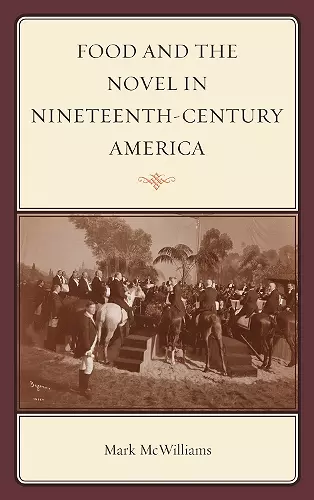Food and the Novel in Nineteenth-Century America
Format:Hardback
Publisher:AltaMira Press
Published:14th Jun '12
Currently unavailable, and unfortunately no date known when it will be back

Food and the Novel in Nineteenth-Century America revolves around the 1840 presidential election when, according to campaign slogans, candidates were what they ate. Skillfully deploying the rhetoric of republican simplicity—the belief that plain dress, food, and manners were signs of virtue in the young republic—William Henry Harrison defeated Martin Van Buren by aligning the incumbent with the European luxuries of pâté de foie gras and soupe à la reine while maintaining that he survived on “raw beef without salt.” The effectiveness of such claims reflected not only the continuing appeal of the frontier and the relatively primitive nature of American cooking, but also a rhetorical struggle to define how eating habits and culinary practices fit into ideas of the American character. From this crucial mid-century debate, the book’s argument reaches back to examine the formation of the myth of republican simplicity in revolutionary America and forward to the popularization of cosmopolitan sophistication during the Gilded Age. Drawing heavily on cookbooks, domestic manuals, travel writing, and the popular press, this historical framework structures a discussion of ways novelists use food to locate characters within their fictional worlds, evoking or contesting deeply held social beliefs about gender, class, and race. In addition to mid-century novelists like Hawthorne, Melville, Stowe, and Warner, the book examines popular and canonical novels by writers as diverse as Lydia Maria Child, James Fenimore Cooper, Susanna Rowson, Catharine Sedgwick, Mark Twain, Edith Wharton, and Harriet Wilson. Some of these authors also wrote domestic manuals and cookbooks. In addition, McWilliams draws on a wide range of such work by William Alcott, Catharine Beecher, Eliza Leslie, Fannie Merrit Farmer, Maria Parloa, and others.
McWilliams's Food and the Novel in Nineteenth-Century America is a delightful must-read for anyone interested in food history or American literature. It is thoroughly researched and every page brims with valuable insights and surprising connections. -- Andrew F. Smith, culinary historian
Why was food so crucial in the 1840 election? Mark McWilliams's engaging book shows how nineteenth-century American foodways reflect contrary desires for simplicity and sophistication—the frontier vs. France. Novels and guidebooks helped readers manage anxieties about what good Americans should eat. Ranging widely from White House dinners to Gilded Age restaurants and new technology, McWilliams shows how class, gender, and regional issues shape the changing meanings of republican simplicity. -- David Leverenz, University of Florida
McWilliams's book joins a small but growing literature on food studies by American literature scholars who meld literary criticism, foodways research, and cultural history. McWilliams argues that treatments of food in the 19th-century novel reflect an ongoing tension between the ideals of republican simplicity and the growing cosmopolitanism of an increasingly industrialized, urbanized country. By interweaving his discussion of literary texts with extensive research on culture and foodways, he creates a rich tapestry of American life in the 19th century, both real and as depicted in fiction. The book tracks novelistic celebrations of simple, native, and frontier foods in the formative years of the Republic; the impact of the rise of scientific cooking on the novel; and treatments of food in late-19th-century novels in which luxurious food, and especially food eaten out, paradoxically becomes both a coveted marker of wealth and a sign of American decadence. The author's incorporation of numerous quotations … infuses the strong and pleasurable flavor of the original texts. Summing Up: Recommended. Lower-division undergraduates and above; general readers. * CHOICE *
ISBN: 9780759120945
Dimensions: 234mm x 160mm x 20mm
Weight: 490g
220 pages